
tokyo

The post The Lies – Part 2 appeared first on Litterbox Comics.
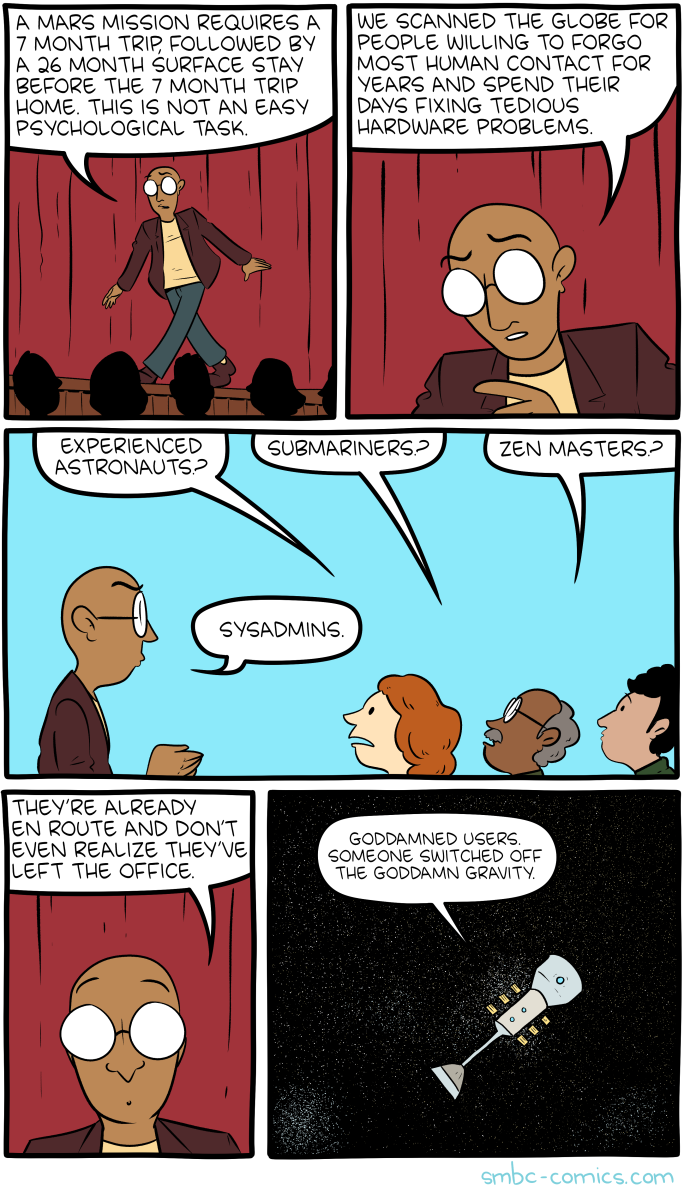
Hovertext:
Unfortunately, the breeding population of Mars was entirely sysadmins, resulting in dangerous founder effects. On the plus side, their revolution against Earth will be entirely passive-aggressive.
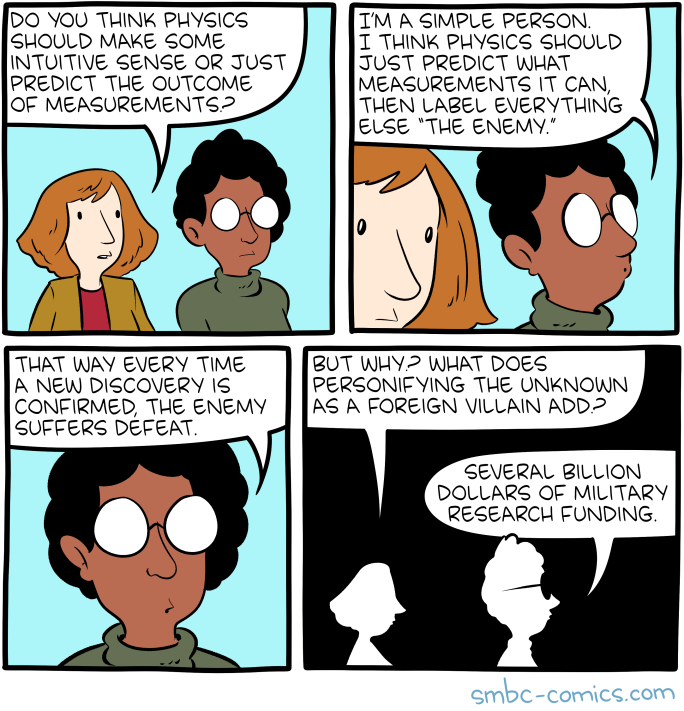
Hovertext:
And, because fundamental physics isn't worked out, enemies are everywhere!
Sounds complicated!
This month’s raffle prize goes to Walt from MN, who gets a signed print and book (it’s a rollover). Congrats!
If you want to join the raffle fun, or just show some love to J&M in the form of a small monthly donation, go you can go here:

Hovertext:
I have nothing pithy to say. This is my Magnum Opus.
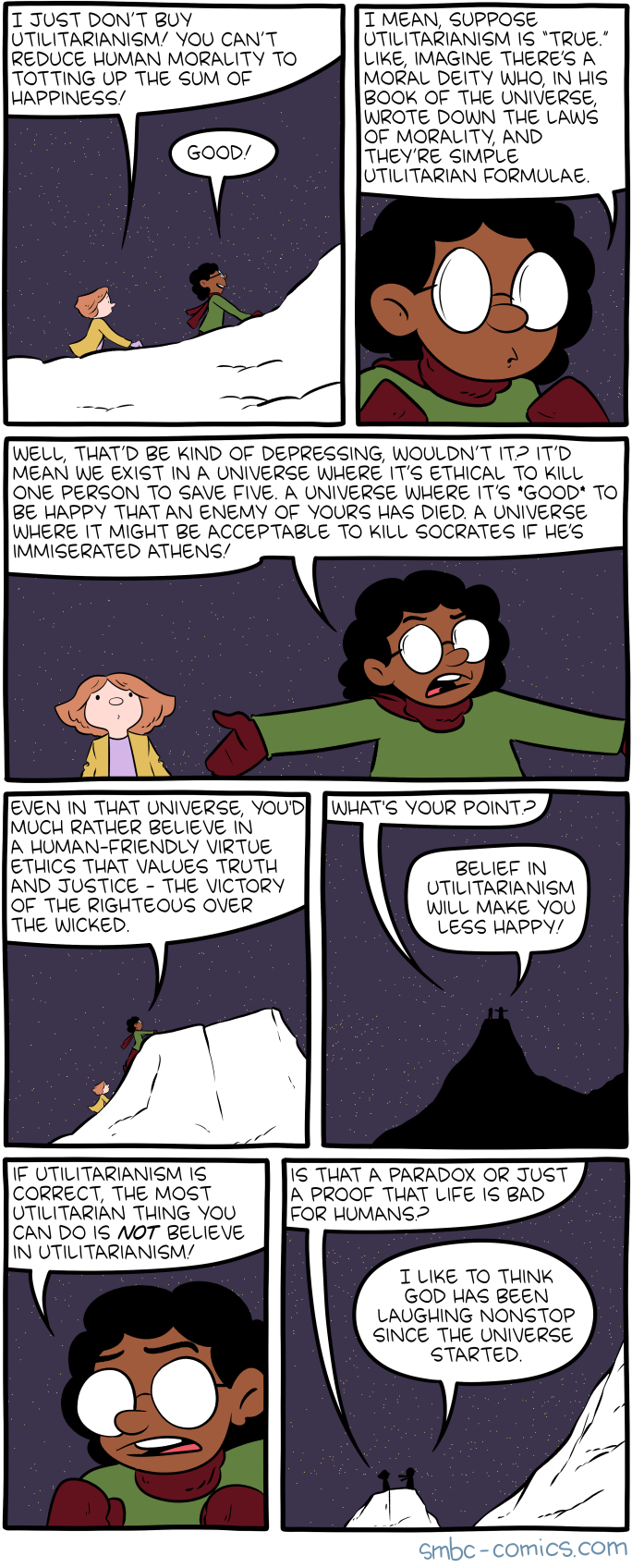
Hovertext:
Before you tell me I've misunderstood, bear in mind that your email will decrease my happiness.
Soonish is out in paperback for just 12 bucks!


Hovertext:
And now you know why your computer science friend has, let's say, an imperfect grasp on common sense.
Tomorrow night. Prepare to have science ruined forever, once again!


Hovertext:
Looks like the London one sold out super early, but you can still get tickets on standby.
When Gunpoint did well, in 2013, I thought: “I should give some money to charity. But this might have to last me the rest of my life. So I should wait til I have a second game out, and see how that does.”
When Heat Signature did well in, 2017, I thought: “It’s doing great so far! But how fast will it trail off? This has to cover the budget of the next game. What if Steam’s algorithm changes and all our revenue stops? Maybe after the third game I’ll know more about-”
I see what my brain is doing. There’ll always be enough uncertainty in my life that I can delay a donation in the name of caution. But I don’t think that loop ends on iteration 3 or 4, so I’m cutting it short now. I’m giving $25,000 to the Against Malaria Foundation and another $25,000 to GiveDirectly.
Malaria prevention is a cause that is not at all close to my heart. To my knowledge it hasn’t affected anyone I know. But only giving to causes close to you contributes to a global injustice with charity. The people with the most money to give are geographically and culturally distant from the people who most desperately need it. Of the $410 billion donated by Americans in 2017, only 6% went to international charities.
Everything else I do with my money is about me, my family, or people I individually care about. For charity, I just want to know “Where is this most needed?”
From the Atlantic, quoting the Against Malaria Foundation:
Every day, more than 500 people die from malaria in the Democratic Republic of Congo, and the majority of these deaths are children under the age of five. AMF offers a shattering metaphor: Imagine a fully booked 747 airplane and infants strapped into seats A through K of every row of the economy section; their feet cannot reach the floor. Every day, this plane disappears into the Congo River, killing every soul on board. That is malaria — in one country.
There are known, proven ways to help prevent infection, they’re incredibly cheap. Long-lasting insecticide-treated nets have been proven effective in over 20 randomized controlled trials, and they cost less than $5 each – and yet their distribution is still constrained by funding. In other words, malaria prevention charities really do need money, and they can make incredibly impactful use of everything they get.
GiveDirectly are a charity that just gives your money directly to the extreme poor in Kenya, Uganda and Rwanda, no strings attached, so they can spend it on whatever they need.
There’s sometimes scepticism about what this kind of donation ends up being spent on, but it’s not supported by the evidence. Charity assessor GiveWell say:
Cash transfers also happen to be the most extensively studied non-health intervention we know of. In a large number of high-quality studies, researchers have looked to see whether cash transfers have indeed increased consumption, what sorts of consumption they’ve increased, and whether common concerns about them are supported by evidence. The consistent picture that emerges from these studies is that cash transfers generally do increase consumption, particularly on food, and that evidence to support common concerns has not emerged despite being looked for.
…
There is a smaller set of studies implying that people get significant return on investment from cash transfers, even over the long run; the case for longer-term impacts of cash transfers is broadly comparable to the case for longer-term life improvement impacts of our other top charities’ health interventions, and the cost-effectiveness according to our best estimates is in the same ballpark as well.
An example that surprised GiveWell was that the money is often spent on buying a metal roof. Mud and thatch rooves leak and have an ongoing cost in repair and maintenance – a metal one doesn’t. But GiveWell don’t know of any charity that provides people with metal rooves. Sometimes the most pressing problems in people’s lives can’t be foreseen and solved at scale by external bodies.
Giving directly also partly avoids the paternalism of dictating to poor people what’s best for them, when we have only the most abstract notion of what their lives and problems are like.
I mentioned GiveWell – they’re an independent charity that takes a scientific approach to evaluating the effectiveness of other charities. Against Malaria Foundation and GiveDirectly are both consistently in their top picks for the most demonstrably effective charities in the world. That doesn’t necessarily mean they’re the best or that the others are bad – when GiveWell can’t recommend a charity they’re not saying it’s not effective, they’re just saying the information they’d need to say it’s effective is not available. There are many types of charities whose effectiveness is hard to measure because it’s hard to measure, not because it isn’t there – research is especially hard to predict and rate.
But I still think it’s really valuable to have that little island of knowledge in a sea of uncertainty. To say, “we don’t know if another charity might be more effective, but we do know for sure that these ones have an extraordinary positive effect on people who desperately need it.”
Yeah, a bit. But there are some good arguments why the distribution of insecticide-treated mosquito nets is a problem that needs to be fought at scale. For one, there are multiplicative benefits if everyone in a community is protected. And the main recipients are children under 5, where the ‘decide for themselves’ argument doesn’t really apply. There’s a very fair-minded comparison of these two kinds of charity on GiveWell’s blog, that concedes the virtues and downsides of both approaches.
I only have a normal amount of time to give, but a larger-than-normal amount of money. I could give both, of course, but I’m not that good a person. I would also stop making money if I did that, so the cause would lose out on a future donation like this and only get the services of a nervous game designer in exchange – not a great trade.
It is! Thanks.
True, I could potentially benefit from posting about this! But I don’t care whether this is altruism or not. I’m more interested in potentially helping to normalise it, and keeping it secret to be more virtuous doesn’t help with that. If you have two hits on Steam, it should be normal to give something significnat to some kind of charity. It should be normal to give more, but I haven’t entirely overcome my cautious instincts.
I have the smaller of those things!
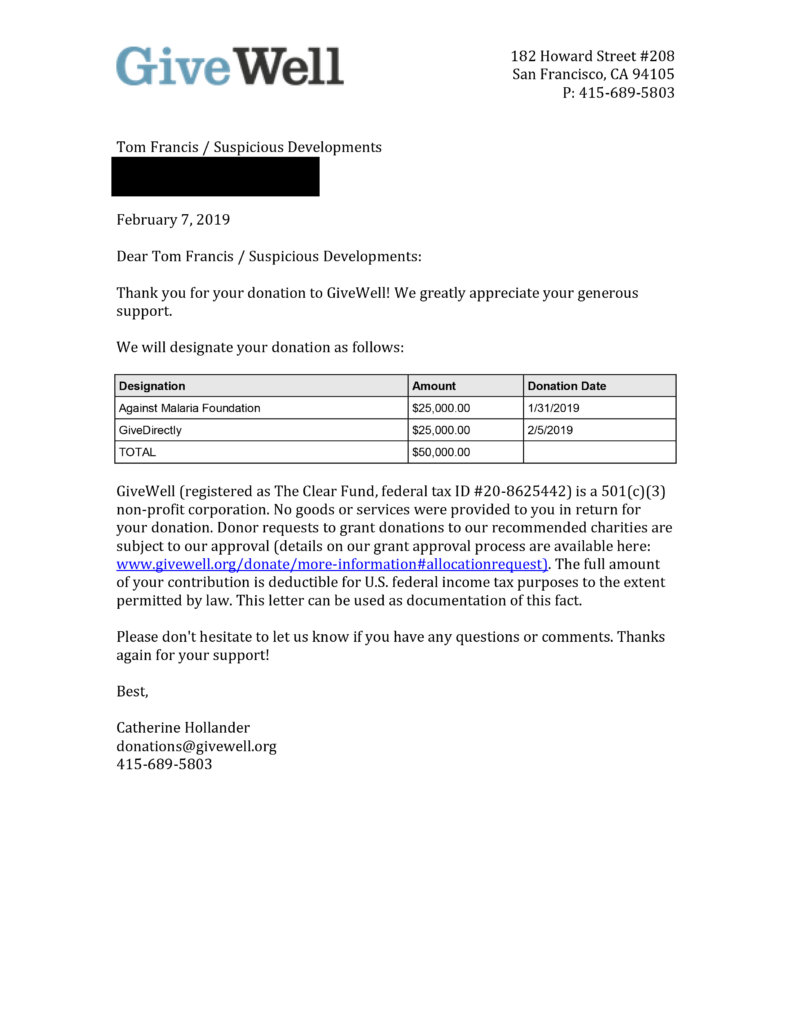
Some technical details:
This year I’ve started tracking the hours I spend programming, because generally once I start tracking something I naturally start to optimise it. I’m not a workaholic – I’m at greater risk of not putting in the hours than of putting in too many, and I’d like to make sure I’m putting in enough.
Programming is about 40% of my job. Another 40% is design, and the other 20% is every other job on a game that isn’t art or music. The design part is hard to track though: I find most productive design thinking comes from a big engine in the back while you’re doing other things, as it randomly matches disparate ideas and sprinkles them with what you’re currently experiencing and asks: “Is that anything?”
Programming, though, I can measure: I start a timer and then focus on work for anywhere from 8 minutes to 80. If I get the urge to check Twitter, I can but I have to stop the timer to do it, and only log the work time. I only get to log the time if it really was focused work – all breaks and interruptions and meals and everything else is excluded. Back when I notionally worked an 8 hour-a-day job, I had an hour for lunch, lots of Twitter breaks and interruptions. I’d be surprised if I averaged as many as 6 productive hours a day.
Anyway, here’s my first full week’s programming time tracked:
The faint numbers below the days are individual work sessions, that’s where I log them. I know there are apps to automate this but my actual focus doesn’t always correlate to which app I’m switched to, I prefer to do it manually so the data is meaningful. It’s also a satisfying moment to type the number in and see the bar go up.
This comes to about 30 hours, which struck me as alarmingly low at first. It felt like a very full week! But I was forgetting a few factors:
So, actually, pretty good! The graph we’ll never see is how much more I started working because I knew it was being tracked – that’s one of the reasons I started. Since I’m hovering around 4-5 hours on a normal work day, I’ll aim to get that to a solid 5.
I did not log the time I spent tweaking the layout and colours of this graph.
Some features of my week:
I set aside Mondays for dealing with all the company, tax, phonecalls, organisational bullshit I hate, and e-mails which I don’t hate but did not respond to at the time. When this piles up during the week, unless it’s urgent, this system lets me shelve it guilt-free, knowing exactly when I’ll get to it. I also do a lot better with tasks I dislike when I know they’re coming – I kinda dread Mondays (I picked Monday so I’d dread the same day as folks with office jobs), but that makes dealing with them easier. I wake up knowing the day will be all bullshit, no hope of doing any interesting work. And if I can plow through the bullshit quickly, I get the rest of the day off. I also relax any diet/booze restrictions on Business Mondays, a policy offices should adopt also.
I’ve been doing Business Mondays for about 5 years now and it’s one of the most successful habits I’ve made for myself since going independent – it stops the bullshit getting you down or derailing the productive stuff. As you can see I actually did end up doing a couple of hours of real work last Monday – this was on a side-project, as a reward for getting all my boring stuff done.
This is new, not sure if I’ll stick to it, but I was remembering Google’s 20% time and wondering if that could work for my back-burner projects. My main project is Tactical Breach Wizards, and it’s progressing in ways I’m optimistic about, but it hasn’t been fast. I sometimes get anxious about it because our artist John Roberts made it look so good so fast, and people reacted so well to it, that it basically has to be made. That’s two massive lucky things I’m grateful for, but I’m used to having literally a year to fuck around with ugly prototypes of random shit I make up before having to decide which one is my real project. Feeling ‘locked-in’ so early makes me anxious, and having side-projects relieves some of that.
So, I thought, maybe Saturdays are for side-projects? No hour quota, work as much or as little as I fancy. And you will see from the hour count that I fancied quite a lot. The two games I play most these days are Slay the Spire and Race for the Galaxy, and my fascination with digital, single-player card games has got to the point that I wanted to try making one. I’m also interested in trying something mechanics-heavy but completely non-violent, which means it’ll probably end up being about destroying suns. I’m making it in Unity to make sure I’m learning new things about the tools that’ll help the main project.
Towards the end of Heat Signature, when I really needed to put in the hours, I’d sometimes give up on a bug at 6pm, have dinner, then watch TV with my laptop open and just tinker absently with it as I’m watching. It was amazing how often this solved it. When focus fails, taking the pressure off and putting your brain in the open mode is really effective. I’d also sometimes do it if the next day’s work was a big, daunting new task – just scope it out while relaxing, no pressure to get anywhere with it, and I often made surprising progress.
So now I do this occasionally, if I’m stuck on something or just didn’t find the hours in the daytime. I log this as half-time for the graph – an hour of chillwork is 30 minutes of productive time. No idea how accurate that is.
Well, the graph don’t lie, I didn’t do this. But that was evening chillwork, while watching movies. It was work I was excited to do, and sitting there forcing myself to fritter the time away instead wasn’t appealing. I won’t do this kind of thing when the side-project hits a tough part or just needs grunt work, that’s when it gets draining.
When I was making Gunpoint, towards the end, I was doing 5 days at PC Gamer and 2 days on Gunpoint. The idea here is just: don’t do that.
I work from home in the morning, work out, have lunch, then go to a cafe for the afternoon’s work. I settled on this order of things because:
Working entirely from home is more efficient, but if I do it for too long my mood starts to suffer. I lose perspective, small problems seem maddening or utterly insurmountable. In a cafe, when a problem is driving me nuts, I feel the initial frustration but then catch myself and get perspective.
Obviously I’m amazingly lucky to have this kind of freedom over my working life. That much freedom can be dangerous: if you don’t consciously get on top of it, create systems and measure the results, you can end up throwing away a huge gift and being miserable despite it.
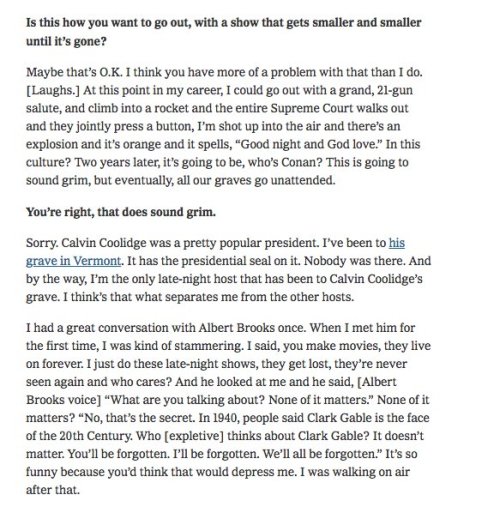
Mind egyedül halunk meg, és 2 generációval később már senki sem emlékszik majd ránk. Good night?
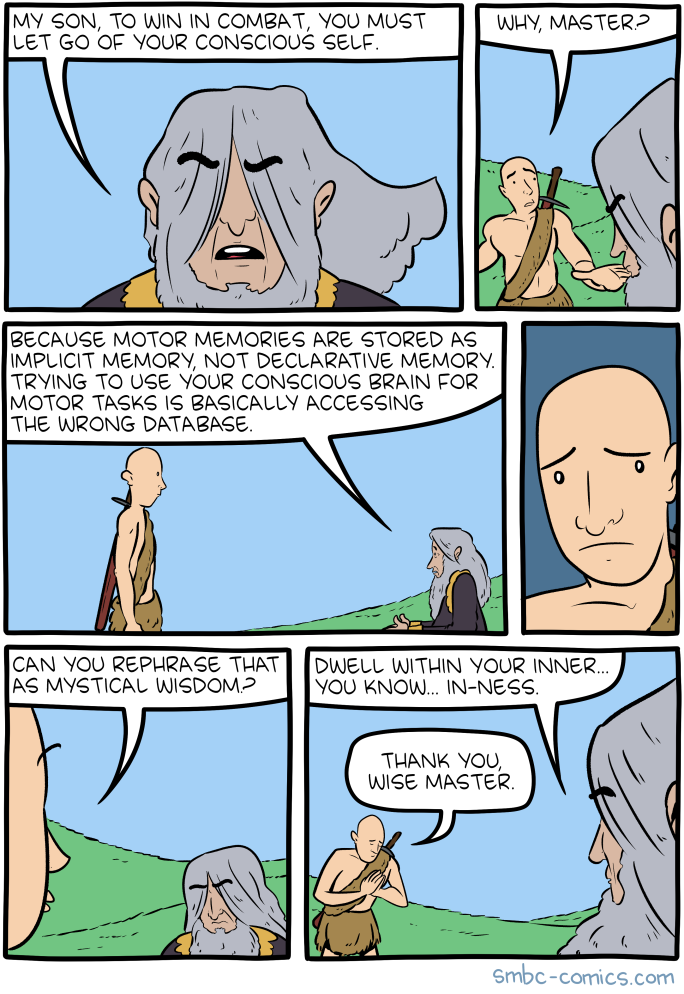
Hovertext:
I think you could make a really good Star Wars movie where scientists discover force access is just a matter of implicit memory, and the robes and sayings are all just layered on top.
Happy New Year, geeks!